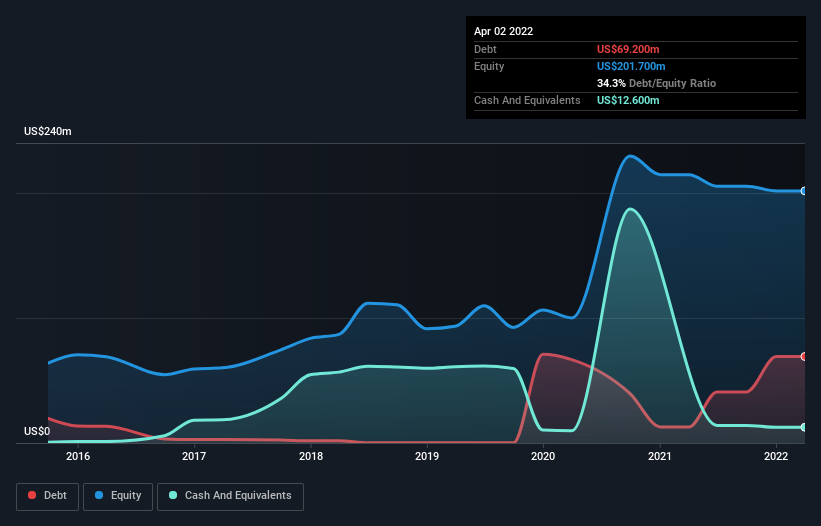- United Kingdom
- /
- Aerospace & Defense
- /
- LSE:AVON
Here's Why Avon Protection (LON:AVON) Can Afford Some Debt

Some say volatility, rather than debt, is the best way to think about risk as an investor, but Warren Buffett famously said that 'Volatility is far from synonymous with risk.' So it might be obvious that you need to consider debt, when you think about how risky any given stock is, because too much debt can sink a company. We note that Avon Protection plc (LON:AVON) does have debt on its balance sheet. But should shareholders be worried about its use of debt?
When Is Debt A Problem?
Generally speaking, debt only becomes a real problem when a company can't easily pay it off, either by raising capital or with its own cash flow. If things get really bad, the lenders can take control of the business. While that is not too common, we often do see indebted companies permanently diluting shareholders because lenders force them to raise capital at a distressed price. Of course, the upside of debt is that it often represents cheap capital, especially when it replaces dilution in a company with the ability to reinvest at high rates of return. The first step when considering a company's debt levels is to consider its cash and debt together.
View our latest analysis for Avon Protection
What Is Avon Protection's Net Debt?
The image below, which you can click on for greater detail, shows that at April 2022 Avon Protection had debt of US$69.2m, up from US$12.9m in one year. On the flip side, it has US$12.6m in cash leading to net debt of about US$56.6m.

A Look At Avon Protection's Liabilities
According to the last reported balance sheet, Avon Protection had liabilities of US$48.7m due within 12 months, and liabilities of US$129.5m due beyond 12 months. Offsetting these obligations, it had cash of US$12.6m as well as receivables valued at US$44.5m due within 12 months. So it has liabilities totalling US$121.1m more than its cash and near-term receivables, combined.
While this might seem like a lot, it is not so bad since Avon Protection has a market capitalization of US$277.5m, and so it could probably strengthen its balance sheet by raising capital if it needed to. But it's clear that we should definitely closely examine whether it can manage its debt without dilution. When analysing debt levels, the balance sheet is the obvious place to start. But ultimately the future profitability of the business will decide if Avon Protection can strengthen its balance sheet over time. So if you want to see what the professionals think, you might find this free report on analyst profit forecasts to be interesting.
Over 12 months, Avon Protection saw its revenue hold pretty steady, and it did not report positive earnings before interest and tax. While that hardly impresses, its not too bad either.
Caveat Emptor
Over the last twelve months Avon Protection produced an earnings before interest and tax (EBIT) loss. Indeed, it lost US$2.0m at the EBIT level. Considering that alongside the liabilities mentioned above does not give us much confidence that company should be using so much debt. Quite frankly we think the balance sheet is far from match-fit, although it could be improved with time. However, it doesn't help that it burned through US$9.6m of cash over the last year. So suffice it to say we do consider the stock to be risky. There's no doubt that we learn most about debt from the balance sheet. But ultimately, every company can contain risks that exist outside of the balance sheet. For example - Avon Protection has 1 warning sign we think you should be aware of.
If you're interested in investing in businesses that can grow profits without the burden of debt, then check out this free list of growing businesses that have net cash on the balance sheet.
New: Manage All Your Stock Portfolios in One Place
We've created the ultimate portfolio companion for stock investors, and it's free.
• Connect an unlimited number of Portfolios and see your total in one currency
• Be alerted to new Warning Signs or Risks via email or mobile
• Track the Fair Value of your stocks
Have feedback on this article? Concerned about the content? Get in touch with us directly. Alternatively, email editorial-team (at) simplywallst.com.
This article by Simply Wall St is general in nature. We provide commentary based on historical data and analyst forecasts only using an unbiased methodology and our articles are not intended to be financial advice. It does not constitute a recommendation to buy or sell any stock, and does not take account of your objectives, or your financial situation. We aim to bring you long-term focused analysis driven by fundamental data. Note that our analysis may not factor in the latest price-sensitive company announcements or qualitative material. Simply Wall St has no position in any stocks mentioned.
About LSE:AVON
Avon Technologies
Provides respiratory and head protection products for the military and first responder markets in Europe and the United States.
Flawless balance sheet with reasonable growth potential.
Market Insights
Community Narratives



